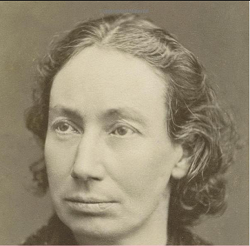Francis and Louise, two ganders
Two persons dissimilar and even
adversarial in many ways, and yet in accordance with each other
on the same axis: The search for a good man and the
world's change into Good. Just be one
within you by means of Good achieved, says The
Revelation of Arès (xxiv/1).
Both of them were violent at first : Francesco di Pietro
Bernardone, who was future Francis of Assisi, was a soldier and
prisoner of war; Louise Michel was a uniformed Communard
sentenced to deportation. And then they both change.
Seven centuries apart each of them donned the new coat (Rev
of Arès 1/1) depending on his or her attitude and way of
acting. Both of them were not outlawed then, but they were
morally caged. Can anyone see the cage? (Rev
of Arès xxxvi/3). Yes, their respective champions and
admirers could, small circles.
The modern press strikingly presents murderers, violent people,
outrageous persons, the police, the law, but it seldom mentions
agents of Good. The same happens for the Arès
Pilgrims, who each as best as possible act so as to get humans
beings to change (Rev of Arès 30/11) and get the world
to change (28/7).
Faithfulness to Good is to bear fruit, nonetheless.
____________________________________

Louise Michel,
also known as Enjolras (1830-1905)

Francesco di
Pietro Bernardone,
also known as Francis of Assisi (1182-1226)
The Father calls Francesco du Pietro
Bernardone, known as dit Francis of Assisi, the gander
(Rev of Arès xxxvi/3), because ganders
have a fighting spirit. Francis was a stubborn fighter in his own
way. His denial of ordinations whether minor or major was one of
his strategies against the religious damage that had deeply hurt
the very simple Core of Jesus' spirituality.
Francis used to fight against himself as well as the worldly
temptations in order to remain "lady poverty and lady simplicity's
husband" and love all of the living, "brother wolf"
included.
Louise Michel, also known as Enjolras, who was a pugnacious
anarchist and a freemason, was another kind of gander
fighting the strong grip of evil. She too declined honors and
rankings whatever and she was forever struggling by her pen and
word for absolute freedom, which she considered as the sole real
dignity and ultimate superiority of men over the living world.
In all periods of history people have taken the path
towards the new man. The Revelation of Arès asks
the Arès Pilgrims, heterogeneous as they are too, to take over the
work of the builders of free Good so as to change
the world (Rev of Arès 28/7). We are living an
adventure different from Francis and Louise's adventures, but
parallel to them.
I dare think that both of those Children of Life
have had the same fate. Those two great humble humans, who seemed
to look stark unlike, were fighters for the free
grandeur of man. They each in his or her way were well aware of
the possible settings of new targets along the Right Route.
Each of them, Francis as a gentle, humble, pious monk and Louise
as a wordy, strong, defiant woman, found his or her path.
A path to Francis's great sobriety and love
and Louise's anarchism. However, both of them used to burn with
the same fire, the fire of transcendence, which is the sole way to
transfiguration.
There are no such things as temperate or undue Good and
temperate or undue Evil; there are just Good and Evil —
it is as simple as that. For millennia good life has come down to
human beings' good modus operandi as planned by rulers digging
their heels in over all the issues and their privilege and
absolutely unwilling to budge an inch from the law they impose,
dance masters and enforcers of their own will to power. Rulers
have begotten some advances sometimes, but they remain the main
line of Evil. Everywhere on earth court decisions consist of endless
retaliation (Rev of Arès 27/9), war is always potential,
freedoms are curtailed.
Since time immemorial, since Adam invented a few people's power
over all other men (Rev of Arès 2/1-5, vi/7-13), all
other men are frozen and dumb with fear, "life fails to live" as
Adorno said. Here and there some bold people ventured to reprobate
and brave the power, whether religious, or political, or other
than these, so that the real refuge of Good has always
been the fellow human being, but never the priest, nor the
politician, nor the judge, nor the administrative one, simply put
the manipulative power which has forever reified humanity under
its law. In fact Good has an absolute value and
cannot be achieved outside absolute freedom (Rev of Arès
10/10), which is the risk the world has to be prepared to
assume in order to change for the better.
Francis of Assise and Louise Michel each in his or her own manner
did oppose the stuffing of man by sciences (Rev of Arès 33/8,
38/5) theologicl, political, social, economical and so on.
Conspicuously or unconspicuously religion as well as politics have
always tried to fossilize human psyche. Notwithstanding the most
tyrannical processes, the seat of emotion and thinking has
remained uncontrolled as a substrate. Over thousands of years
religion and politics have never succeeded in stabilizing the
faithful or citizens' submission; all needs to be completely
redone in each new generation. History is just filled with
rebellions or threats of rebellion. So hope stays alive forever.
This shows why Francis and Louise, two great persons full of
life, saw love as the only way towards Good.
In a short entry on a huge subject I cannot take up writing the
complete biographies of two human beings whose lives are
awfully different. I stick by the intangible similarity with each
other, beyond the facts of their own lives: Transcendence.
Although God, who had been the single Sea on which
Francis used to navigate, disappeared from Louise's rhetoric, I
think of their similar way of transcending the self in this blog
entry, because we wonder at transcendence and all the fighters for
Good will wonder on at it until the Day (Rev of Arès
31/8) breaks. We must opt for transcendence, the flying
carpet towards infinity, and not be distracted by the glaring
world where we stay for a few decades. Transcendence is becoming
increasingly needed at a time when man's thought is ruled by
measurable, tangible, heavy materialism. Before 1974-1977
transcendence fell within the scope of religion, but since then The
Revelation of Arès has taught us that God is not the only
purpose of faith. The purpose is Good, to which love
leads man. The Word of Arès calls it penitence, so
that the concept of God widens immensely and even vanishes to be
replaced by a much wider notion: Life (24/3-5), whose
atoms we are. God does not secure salvation, but Good
achieved secures it, because God appears through
Good as He is, that is, the Sanctity, the Power
and the Light (12/1) of Life (24/3-5). As a
result of this a woman like Louise Michel, though she was not a
believer, cemented her place in the Good-makers' hall of
fame, so that the concept of Salvation widens
immensely. Francis and Louise are prophets in the purest
happy, active sense.
Prophetism arises from freedom and daring of concern and love;
it does not arise from a doctrine.

Xxxx xxx xxx xxx
Signature
Réponse :
Xxxxx xxx xxx xxxx
00xxx00 231C2
Xxxx xx xxxx xxx xx x xxxxxxxx xxx xxxxx xx xxx .
Signature.
Réponse :
Xxxx xx xxxx xxx xx x xxxxxxxx xxx xxxxx xx xx.